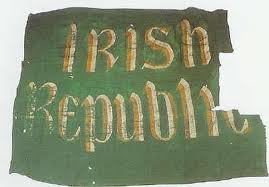I was down in Dublin over the Easter period and I happened to pass Hodges Figgis bookshop. The display window was filled with books of all sorts, many of them dealing with aspects of Easter 1916. My belief that the coming centenary will generate massive public interest is reinforced by a letter in today’s Irish Times by Tom Stokes, a grandson of John Stokes, who was part of the Boland Mills Garrison in 1916. In the letter Stokes ticks off Alf MacLochlainn, the grand-nephew of Patrick Pearse, for lamenting the absence of commemorations of the Easter Rising.
Stokes points out that he is the co-ordinator of the Citizens’ Campaign for Republic Day. They are hoping that on April 24, 2014, Republic Day will be celebrated in all 32 counties of Ireland building towards “a very significant and unique commemoration by citizens on Republic Day, 2016”.
I find that very cheering. Now that it’s safe to do so, many southern political parties will be trumpeting their republican credentials. The south’s government in particular will be keen to take control of whatever commemorations are held.Stokes’s campaign seems to be non-party, which is a very good thing. The focus should be on the men and women who showed massive courage and dedication to the nation 100 years ago, not on political parties. I’m also cheered by Stokes speaking of all 32 counties. There are those who would like to glide past that aspect of the republic proclaimed on the steps of the GPO; they’d prefer to encourage people to think of real Ireland existing south of the border only. If Stokes’s campaign achieved nothing else than to re-awaken a realisation in citizens south of the border that those of us living in this part of the island - all of us living here, regardless of political views - are their fellow-countrymen, then his campaign will have been eminently worthwhile.
Such a change, like a change almost 100 years ago, would be as miraculous as it is welcome.
Easter, 1916
I have met them at close of day
Coming with vivid faces
From counter or desk among grey
Eighteenth-century houses.
I have passed with a nod of the head
Or polite meaningless words,
Or have lingered awhile and said
Polite meaningless words,
And thought before I had done
Of a mocking tale or a gibe
To please a companion
Around the fire at the club,
Being certain that they and I
But lived where motley is worn:
All changed, changed utterly:
A terrible beauty is born.

"The focus should be on the men and women-----------not on political parties". Perhaps you could communicate that to Sinn Fein!
ReplyDeleteIf 2016 is not an opportunity to reappraise and reframe, it will have been a wasted opportunity...
ReplyDeleteHearts with one purpose alone
Through summer and winter seem
Enchanted to a stone
To trouble the living stream.
The horse that comes from the road.
The rider, the birds that range
From cloud to tumbling cloud,
Minute by minute they change;
A shadow of cloud on the stream
Changes minute by minute;
A horse-hoof slides on the brim,
And a horse plashes within it;
The long-legged moor-hens dive,
And hens to moor-cocks call;
Minute by minute they live:
The stone's in the midst of all.
Too long a sacrifice
Can make a stone of the heart.
O when may it suffice?
That is Heaven's part, our part
To murmur name upon name,
As a mother names her child
When sleep at last has come
On limbs that had run wild.
What is it but nightfall?
No, no, not night but death;
Was it needless death after all?
For England may keep faith
For all that is done and said.
We know their dream; enough
To know they dreamed and are dead;
And what if excess of love
Bewildered them till they died?
Dear Sir Iam from DERRY not londonderry
ReplyDeleteGlad you quoted the rest of the poem, Mick. Although I think Yeats was the bewildered one.
ReplyDeletePolitics bewildered him, surely. And he was a better poet than a politician. There's more after that to come, McDonagh and McBride and Connolly and Pearse... But I think excess of love is still to this day pretty penetrating...
ReplyDelete